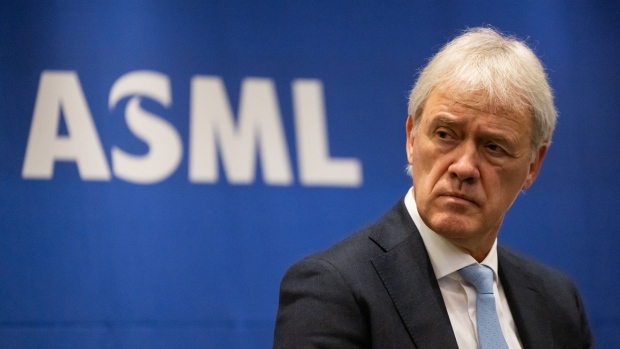Dec 14, 2022
ASML’s CEO Pushes Back on Further Export Restrictions to China
, Bloomberg News

(Bloomberg) -- Dutch chip-gear giant ASML Holding NV has “given up enough” with the pre-existing restrictions on its sales to China, Chief Executive Officer Peter Wennink said.
With an effective ban already in place on its cutting-edge extreme ultraviolet lithography, or EUV, machines, ASML “has already surrendered,” Wennink told Dutch newspaper NRC in an interview late Tuesday. Wennink said US chip-gear makers benefited from that restriction as more than 25% of their revenue comes from China, whereas the country accounts for 15% of ASML’s sales.
An ASML spokesperson confirmed the comments to Bloomberg News on Wednesday.
Wennink’s comments come as the US is pushing the Netherlands to impose new controls on exports of chipmaking equipment to China. The Netherlands and Japan are the world’s top suppliers, outside the US, of machinery and know-how needed to make advanced semiconductors.
Japan and the Netherlands have agreed in principle to join the US in tightening controls over the export of advanced chipmaking machinery to China, people familiar with the matter told Bloomberg, a potentially debilitating blow to Beijing’s technology ambitions.
With the move, the two country’s officials will essentially codify and expand their existing export control measures to further restrict China’s access to cutting-edge chip technologies.
“What we hear from our Chinese customers is that China is adjusting their roadmap by making more chips that use older production technology, for which the equipment can still be supplied because those chips are still very much needed,” NRC cited Wennink as saying. “If China wants anything with advanced chips, they have to buy very advanced deposition and etching machines, and they mainly come from the US.”
On Monday, China filed a dispute over the US export controls with the World Trade Organization, the country’s Ministry of Commerce said in a statement. Beijing said the restrictions threaten the stability of the global supply chain and that the US’s national-security justification is dubious.
“The intention of the Americans is to hit the Chinese manufacturing industry, but it also affects an important supplier of ours, which has some parts made in China,” Wennink said. “Ultimately, the part that is made in China should end up in a chip machine; ASML is now also indirectly affected by those rules.”
©2022 Bloomberg L.P.





